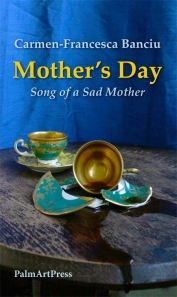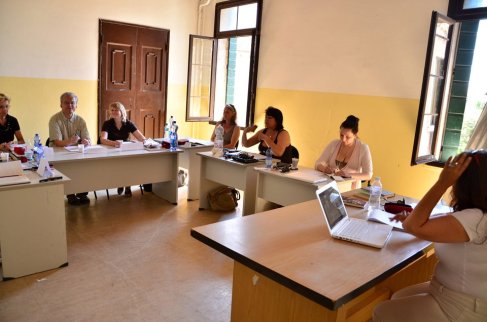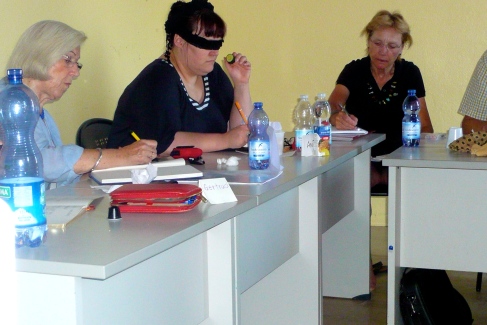COMING SOON!
English Broschur
21 x 12,5 cm
English
from the German
by Elena Mancini
Spring 2015
ISBN: 978-3-941524-47-7
ca. 16,90 Euro
COMING SPRING 2015!
MOTHERS´S DAY – Song of a Sad Mother – Carmen-Francesca Banciu
from the German: Elena Mancini
PalmArtPres, Spring 2015
Carmen-Francesca Banciu’s Song of a Sad Mother is a touching, trenchantly written novel about an anguished mother-daughter relationship that is set against the backdrop of Communist Romania. Its protagonist is Maria-Maria, whose party-loyalist parentage and academic aptitude seem to destine her to become the embodiment of the party’s utopian concept of the new human. The only problem is that Maria-Maria is intent on writing her own destiny. The predetermined quality of Maria-Maria’s life coupled with the fact that Maria-Maria is tyrannized by a mother, who is depressive and deeply distrustful of any type of happiness or pleasure rob the protagonist of a childhood and cause cruelty and harsh discipline to take the place of maternal nurturing and reassurance. It is thus that Maria-Maria’s mother, who’s only indulgence was deprivation, cold-bloodedly destroys her daughter’s dolls only to replace them with books, out of love and to impart upon Maria-Maria the valuable lesson of self-reliance. Armed with this lesson, Maria-Maria is able to take possession of herself and defy every party- and familial expectation. She does this by leaving the past behind and becoming an émigré writer in post-Communist East Berlin. While the crossing of national and political boundaries proves catalytic for Maria Maria in that it enables her to discover her autonomy and individuality, it does not wipe the slate clean of all of her past suffering. It is only by doing the work of remembering that she begins to exorcise her demons and heal the trauma of her painful relationship to her mother. The reinvented Maria-Maria that emerges from the memory work is one who is liberated, self-accepting and endowed with the existential insight that identity is complex and richly-layered nexus of consciousness that encompasses both the past and the future. She also realizes that at a higher plane of consciousness, namely that of forgiveness, the identity positions of mother and child are far from fixed and distinct and distinct from one another but psychically and emotionally intertwined and interchangeable.
Banciu’s Song of a Sad Mother is a poetic, yet uncomprimising revisitation of what it means to become a fully individuated self and the struggle it entails. It shows how memory, in the context of transnational experience, helps to overcome the indoctrination into a rigid ideology and the wounds inflicted by an emotionally-absent and abusive mother. Foregrounding both the particular and universal aspects of motherhood, migration, patriarchy, forging identity against the backdrop of an oppressive regime, abuse trauma, and memory, Song of a Sad Mother will constitute a vital addition to the English-language literary market. As a work of German literature, this novel is highly representative of questions that are central to Germany’s contemporary cultural and social context by thematizing migration and reflecting upon how transnationalism is shaping German and European cultural identity. An English language version of Song of a Sad Mother will contribute to the English language readership’s awareness of types of themes and problems that are popular in post-Reunification, EU Germany. Banciu’s work has been published with much acclaim in Germany, Romania and France. In the past five years, her narratives have inspired works of literary criticism in German, English, and French by scholars who are literate in those languages. Making her work available in English would render the work accessible to a broader popular audience. Further, the fact that this is a work about women and authentically narrated and authored by a woman also renders it a necessary addition to the terrain of also commands its inclusion into the category of literature written by women, a terrain that even in the English language, continues to remain sorely underpopulated.
Elena Mancini
on Carmen Francesca Banciu’s Song of a Sad Mother (Das Lied der traurigen Mutter in the original German













Du muss angemeldet sein, um einen Kommentar zu veröffentlichen.